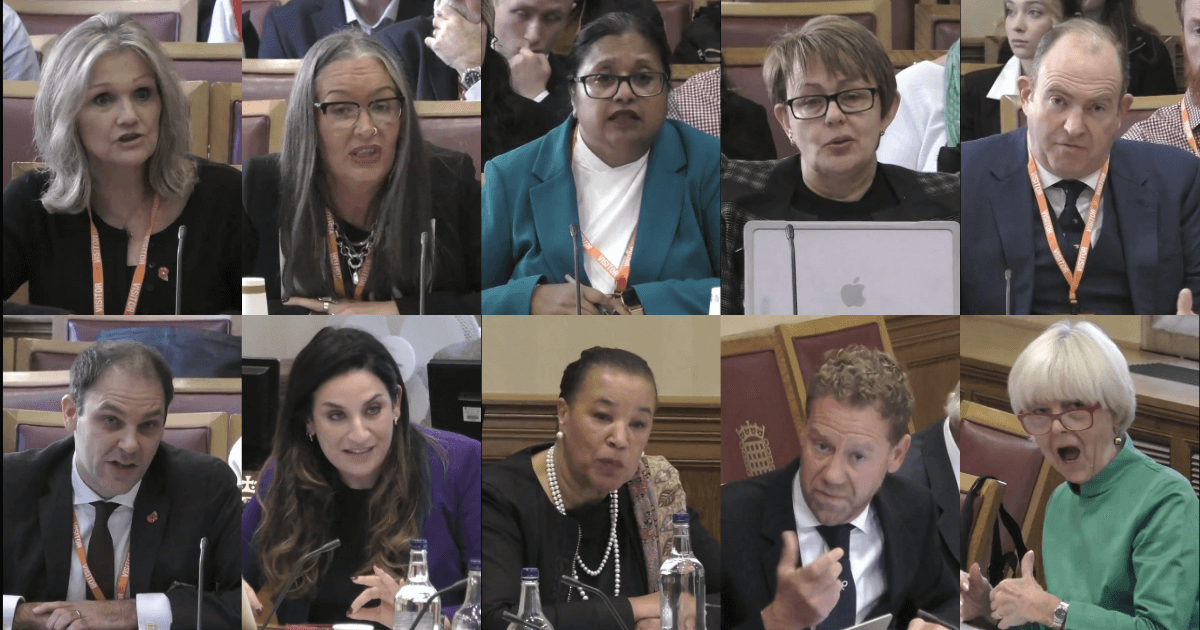The House of Lords assisted suicide Bill select committee held two public sessions last week, the third and fourth sessions respectively, allowing a select group of Peers to interrogate and cross-examine the Terminally Ill Adults (End of Life) Bill through expert witnesses.
The first day of the select committee took place on Wednesday, 22 October. The second day took place on Thursday, 23 October, followed by the third day on Wednesday, 29 October. The wrap-up can be found here.
The fourth day took place on Thursday, 30 October. In the first session of that day, Professor Jane Monckton-Smith OBE, Professor of Public Protection, University of Gloucestershire; Dr Sarah Hughes, Chief Executive, Mind; and Cherryl Henry-Leach, Chief Executive, Standing Together Against Domestic Abuse presented evidence to Peers.
This was followed in the second session by The Baroness Grey-Thompson DBE, Member of the House of Lords; Professor Tom Shakespeare CBA FBA, Professor of Disability Research at London School of Hygiene & Tropical Medicine; Alasdair Henderson KC, Commissioner at Equality and Human Rights Commission; and Ken Ross OBE, Founding Officer at The National Down Syndrome Policy Group.
Assisted suicide Bill does little to safeguard against coercion
During the first session, much of the discussion centred around questions of coercion and abuse of the proposed law. Professor of Public Protection, Jane Monckton-Smith, asked Peers what she called the “key question” regarding coercion: “Is the person trying to escape the abuse and feelings that they have been made to feel a burden or are they trying to escape the suffering of their illness? If we cannot answer that question, then we should be very concerned”.
She told Peers that as many as 34 people every week take their lives because of domestic abuse, suggesting that legalising assisted suicide could benefit abusers and put some of the most vulnerable people at risk.
She continued, arguing that victims of coercion often deny that they are being coerced, which would make spotting coercion in regard to assisted suicide very difficult. “[T]he person who wants to prematurely die will have to state that they are not being coerced”, she said. “We already know that people who are being coerced will more than likely deny that they are being coerced for that very reason”.
“Victims of coercive control, of course, are not a small subset of our community. We also know that, when victims of coercive control get a life-limiting diagnosis, they become even more vulnerable at that point. Domestic abuse tends to rise. They tend to get left, if they are being abused or neglected”, Professor Monckton-Smith continued.
“We know that domestic abuse victims are getting palliative rather than curative care because of the neglect that they have suffered in the relationship and getting their diagnoses late”.
She reiterated how victims often deny their own coercion, saying, “I have seen victims refuse medical help when they have been hit in the head with a hammer through fear. That is not an isolated example. If you speak to the other people here, I think they will probably agree with me. What I am saying is that coercive control is a serious social problem. It will impact on the people who are going to look to this Bill”.
Assisted suicide panels are not enough to prevent harm
Dr Sarah Hughes, the Chief Executive of mental health charity Mind, lamented the removal of the high court judge safeguard on the assisted suicide Bill.
“While there is a panel and there will be various assessments, the person really does need an independent advocate at every point to be able to understand the information that they are being given, the conversations that they are having and so on. It is really interesting that the panel will offer an important stage, but we do not think that is comparable to having a judge. While we do not think it is an either/or scenario, we do think it is a both scenario”.
She continued, warning that video calls are insufficient for assessing someone’s emotional state ahead of an assisted suicide approval. “I would also say, in addition, though, that I do not think you can adequately assess people’s emotional state online. With such a grave decision, that is a huge risk”, Dr Hughes said.
Baroness Smith of Newnham asked the panel of witnesses in the first session if they believed it adequate that “the panel is required to hear from the person to whom the referral relates, or their proxy in applicable cases, either in person or via live video or audio link, or, if the panel considers it appropriate, to use pre-recorded audio or video material”.
No witness believed that this was adequate, with Professor Monckton-Smith saying, “No. In a word, no”.
Ken Ross, Founding Officer at the National Down Syndrome Policy Group, warned that the assisted suicide Bill’s “eligibility panels” could become rubber stamps – risking a repeat of the Gosport scandal, where 100s died after wrongful opiate use.
“My fear is that it will just become another rubberstamping process. When I was thinking about speaking today, it just bothered me. One of the hospitals that is very close to me is the Gosport War Memorial Hospital, and I had not really felt that I had had an update on what happened there, with this extraordinary number of deaths through overmedication of 450-plus people. Some 25 years later, we still do not have a settled view around what happened, what should go on or how we can ever prevent something like this happening again”, he said.
“If we ended up with a situation where there are multiple panel reviews that do not actually address all the concerns that many people have had, we could have the same situation. It could be Gosport on steroids”.
Palliative care is in crisis, which would be made worse by assisted suicide
Baroness Grey-Thompson explained that in 20 countries without assisted suicide, palliative care funding rose by 25%. In states where assisted suicide has been legalised, however, funding for palliative care has only risen by 7.9% in the same period.
Alasdair Henderson, Commissioner at the Equality and Human Rights Commission, said that ensuring high-quality palliative care provision is available for all must take place before any assisted suicide Bill is passed.
“High-quality end-of-life care needs to be available to all and patients properly informed about such services. Inequalities of health access need to be tackled”, he said.
Suicide prevention should be the most important thing, not suicide provision
Dr Sarah Hughes warned Peers that there must be a very clear distinction between any assisted dying legislation and suicide prevention efforts. As somebody who has worked in mental health for 35 years, I can certainly tell you that we are geared up to prevent suicide, not the other way around”, she said.
Dr Hughes continued, “The voices of people with mental health problems and those treating them and caring for them must be heard. People living with a mental health challenge must be able to thrive in their own lives. They must be supported by health and social care in the way that they deserve. We do not believe that is the case across England and Wales at this moment”.
Baroness Grey-Thompson explained that people are more likely to take their own lives at tube stations near hospitals after receiving a terminal diagnosis, challenging the idea that those thought to be terminally ill are not suicidal.
“I sat on the Board of Transport for London for ten years”, she said. “We put additional safeguards in around all the tube stations near hospitals because that’s where there were a higher number of suicides immediately post-prognosis”.
Assisted suicide places people with disabilities at risk
Baroness Grey-Thompson criticised the Bill for being “a danger to disabled people”.
“It would be very easy for disabled people to have it suggested to them that [assisted suicide] is a route to choose”, she continued, due to “problems with health and social care, you can’t get the care you need, you’re living in poor housing”.
Baroness Grey-Thompson stated, “We are told that, you know, it’s not for disabled people, but there are a range of conditions that would very easily fit into a terminal diagnosis, like cystic fibrosis”.
She added that, for people with disabilities like her, if they developed a pressure sore that did not heal, they could easily be given a six-month prognosis, and thereby be eligible for state assistance in suicide.
“There is no organisation of or for disabled people that supports this legislation and we have to be very careful as we progress. As you will have seen, I have already tabled many amendments to this Bill and I will continue to do so”, she continued.
The National Down Syndrome Policy Group’s Ken Ross said, given the issue of “so many preventable deaths among learning disabled people and people with Down syndrome”, he fears medics predetermining how end-of-life should play out.
“That pathway towards the final six months could be predetermined by the practitioners itself. I am very aware, again going back to the ‘do not resuscitate’ notices, of family members who felt that they had to sign the DNRs on behalf of their family member, because they thought that was part of the way that their whole condition was going to be managed, rather than realising that there could be potentially be another course of action which could have a much better outcome”, he said.
Baroness Scotland highlighted that, in places where assisted suicide is already legal, people with disabilities are placed into dangerous situations.
“We have looked at the UN Committee on the Rights of Persons with Disabilities, and its second and third periodic reports on Canada. There were clear indications there with substantial evidence that the rights of people with disabilities were being eroded in Canada as a result of the medical assistance in dying law and the ableist assumption that underpinned the decisions being made”, she said.
Alasdair Henderson agreed, saying, “It is true that it is a longstanding issue raised by those treaty monitoring bodies of health inequalities particularly around disability, and that is why we have raised it as a concern”.












